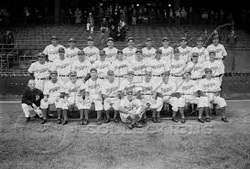
Of course, teams change throughout every successful run. The 1991 Atlanta Braves looked nothing like the 2005 team that won the Division Title. But the Dodgers teams were considered a unit, with Carl Furillo, Ralph Branca, Carl Erskine and Clem Labine among the players that are frequently referenced as well as Snider, Hodges, Robinson, Campanella and others. While the 1947 team bears little reference to the later teams, the 1941 team is a story that is seldom told.
The team at this point had struggled for several seasons. The last time the team won a NL Pennant was 1920, when the team referred to itself as the Robins; named after longtime manager Wilmer Robinson (managed from 1914-1931). The franchise had some good seasons after that, winning 92 games in 1924 and having consecutive winning seasons in 1939 and 1940 under new player/ manager Leo Durocher. 1941 was significant because of Joe DiMaggio's 56 game hitting streak and Ted Williams' .406 batting average. It was also significant because it was the last year of baseball as it was known then, as many players would enlist in the military after the Japanese attacked Pearl Harbor on 12/7/1941.
Mickey Owen is the most prominent name associated with the 1941 Series. It was Owen who dropped Tommy Henrich's swinging strike three that would have won game four of the Series for the Dodgers. Hugh Casey's pitch was missed by Owen, allowing Henrich to reach base when it should have been the third out. The result of the World Series was not good as the Dodgers lost in 5 games, including game 4 (7-4).
The Dodgers were led by OFs Pete Reiser (.309, 5, 46 in 1941) and well known racist Dixie Walker (.306, 9, 94). Walker was known as the one who was circulating the petition to keep Robinson from joining the team in 1947. Among regular players, only Reiser, Walker and Pee Wee Reese, played on both the 1941 and 1947 team. Reese, at age 22, hit just .229, 2, 46 playing in his second season. Only Casey was part of both pitching staffs, going 14-11, 3.89 in 45 games, 18 starts in 1941. Kirby Higbe went 22-9, 3.14 in 48 games, 39 starts in 1941. He was traded in 1947 after 4 games, 3 starts to the Pirates with four others for Al Gionfriddo. Whit Wyatt went 22-10, 2.34 in 1941, with veteran Freddy Fitzsimmons going 6-1, 2.07 in 13 games, 12 starts. He had won 16 games for Brooklyn in 1940 and his career spanned all the way back to 1925 with the Giants. Van Mungo, known more for being part of a song in his name, made 2 appearances on that team after being one of the top pitchers with the Dodgers in the early 1930s (starting in 1931).
Durocher, who came up as a 19 year old for the 1925 Yankees, had 42 ABs that season. He would not play in 1942, batting 18 times in 1943 and 5 in 1945. Hall of Famer Paul Waner made a brief appearance on the 1941 team and was released May 11th that season. As far as the face of the team, Dolph Camilli hit .285, 34, 120 for that team and was only the NL MVP. 1937 NL MVP Joe "Ducky" Medwick had his best season for the Dodgers, after coming over from St Louis the year before, hitting .318, 18, 88. 3B Cookie Lavagetto hit .277, 1, 78 and was 18-69 on the 1947 team. Owen hit .231, 1, 48 and 2B Billy Herman rounded off the regular team, hitting .291, 3, 41.
The Yankees continued to win, taking the AL Pennant in 1942 and beating the Cardinals in the 1943 WS. The Dodgers remained good as well winning 104 games in the 1942 season, losing out to the Cardinals who won 106. The veteran Brooklyn team stuck around for a couple more seasons with youngsters like Bruce Edwards (.295, 9, 80 in 1947), Robinson and Furillo all contributing by 1947. Hodges and Snider made their debut in 1947 after serving in the millitary (Hodges had 2 AB in 1943). It was the 1941 team that started the ball rolling for the Dodgers teams of the late 1940s, 1950s and even 1960s. All the talk around then was about how all the good players and top amateur players wanted to play for the Yankees. All of the sudden, top players, particularly African American players wanted to play in NY, but for the Dodgers.

 RSS Feed
RSS Feed
